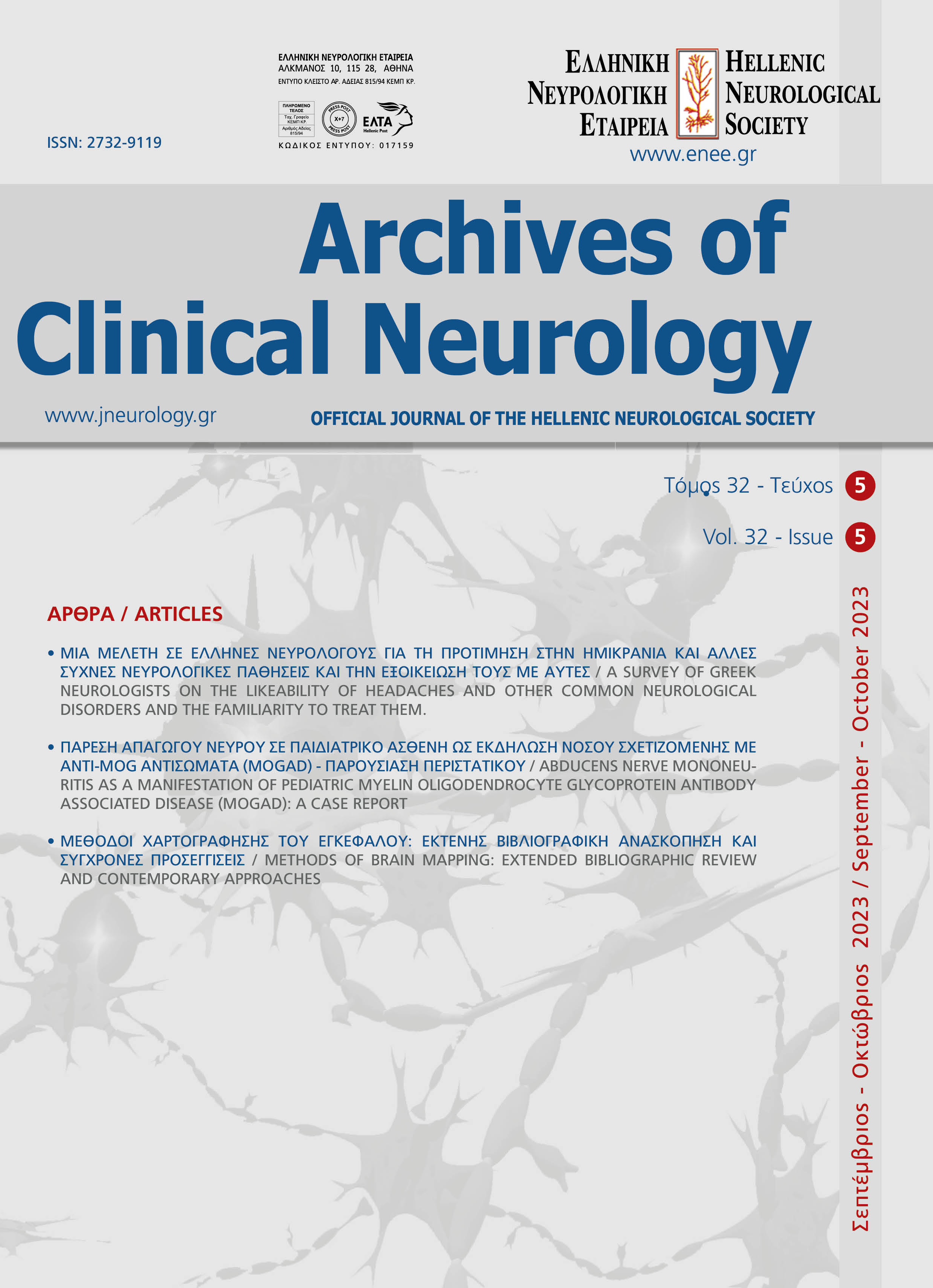ΜΙΑ ΜΕΛΈΤΗ ΣΕ ΈΛΛΗΝΕΣ ΝΕΥΡΟΛΌΓΟΥΣ ΓΙΑ ΤΗ ΠΡΟΤΊ- ΜΗΣΗ ΣΤΗΝ ΗΜΙΚΡΑΝΊΑ ΚΑΙ ΆΛΛΕΣ ΣΥΧΝΈΣ ΝΕΥΡΟΛΟ- ΓΙΚΈΣ ΠΑΘΉΣΕΙΣ ΚΑΙ ΤΗΝ ΕΞΟΙΚΕΊΩΣΉ ΤΟΥΣ ΜΕ ΑΥΤΈΣ
Λέξεις-κλειδιά:
κεφαλαλγία, ημικρανία, αθροιστική κεφαλαλγία, έρευνα, προτιμήσειςΠερίληψη
Ιστορικό: Σε αυτή τη μελέτη αναζητήσαμε τον βαθμό προτίμησης και την εξοικείωση Ελλήνων νευρολόγων στην αντιμετώπιση ασθενών με ημικρανία, αθροιστική κεφαλαλγία, νευραλγία τριδύμου και χρόνια καθημερινή κεφαλαλγία σε σύγκριση με άλλες συχνές νευρολογικές παθήσεις και συμπτώματα. Επιπλέον διερευνήσαμε την συχνότητα των κεφαλαλγιών στους ίδιους τους συμμετέχοντες
Μέθοδοι. Ερωτήθηκαν μέσω διαδικτυακής έρευνας, 180 ειδικοί νευρολόγοι σχετικά με τις προτιμήσεις τους να αντιμετωπίζουν κεφαλαλγίες και άλλες συχνές νευρολογικές παθήσεις. Η προτίμηση και η εξοικείωσή τους αξιολογήθηκαν μέσω μιας πενταβάθμιας κλίμακας (με εύρος από 1: διαφωνώ έντονα έως 5: συμφωνώ έντονα) σε δύο βασικά ερωτήματα: α. Μου αρέσει να παρακολουθώ/θεραπεύω ασθενείς με αυτήν τη νόσο/σύμπτωμα και β. Θεωρώ πως έχω ικανοποιητικό επίπεδο εξοικείωσης και εμπειρίας για να παρακολουθώ και να θεραπεύω ασθενείς με αυτήν τη νόσο/σύμπτωμα.
Αποτελέσματα: Η μέση ηλικία των συμμετεχόντων ήταν 48.2 έτη και ο μέσος χρόνος από την απόκτηση του τίτλου ειδικότητας 14 έτη. Οι ερωτώμενοι έδειξαν προτίμηση στην αντιμετώπιση της ημικρανίας (μ.ο.=4.2) και εξέφρασαν ένα ικανοποιητικό επίπεδο εξοικείωσης με αυτήν (μ.ο.=4.4) σε επίπεδα παρόμοια με την νόσο του Parkinson (μ.ο. προτίμησης=4.2, μ.ο. εξοικείωσης=4.1), της νευραλγίας τριδύμου (4.1 και 4.3 αντίστοιχα) καθώς και των αγγειακών εγκεφαλικών επεισοδίων (4.1 και 4.2 αντίστοιχα). Αντιθέτως οι διαταραχές του ύπνου και το σύνδρομο απνοιών στον ύπνο είχαν μικρότερη προτίμηση (μ.ο.=3.1) με χαμηλή επίδοση και στην εξοικείωση (μ.ο.=3.2). Η συχνότητα της ημικρανίας στους συμμετέχοντες ήταν 35% χωρίς αυτό να φαίνεται να σχετίζεται με την προτίμηση στην αντιμετώπιση της νόσου.
Συμπεράσματα: Οι Έλληνες νευρολόγοι επιδεικνύουν προτίμηση στην αντιμετώπιση της ημικρανίας, της νευραλγίας τριδύμου, της νόσου του Parkinson και των αγγειακών εγκεφαλικών επεισοδίων σε αντίθεση με τις διαταραχές του ύπνου.


